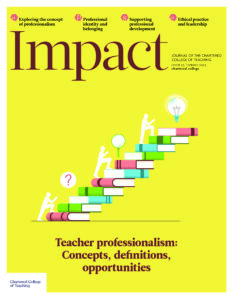Professor Catherine Lee MBE, Professor of Inclusive Education and Leadership (Pro Vice-Chancellor and Dean), Anglia Ruskin University, UK
In this Spring 2025 issue of Impact, contributors help us to navigate the multifaceted concept of teacher professionalism by exploring how the current social, cultural, pedagogical and political climates shape and challenge the educational landscape. As a former secondary school teacher and teacher educator, I am delighted to have been invited to curate the print articles in this issue. Each article offers insightful discussions that reflect on, examine and redefine teacher professionalism. While each contribution is distinct, common themes emerge which include the development of professional identity; teacher inclusivity and belonging; the critical role of professional development; the influence of school culture; and the importance of ethical leadership.
Educational settings do not exist in a vacuum. Teacher professionalism is a complex and perpetually evolving concept that encompasses teacher roles, identities, and practices. In the UK, the cultural, political and socio-economic climate significantly influences the educational landscape, shaping the challenges and opportunities that teachers face. Navigating professional dilemmas and professionalism has become and will continue to be more complex than ever for teachers, whatever the stage of their careers, and so this collection of articles provides a much-needed reflection and exploration on what it means to be a teacher in 2025.
The initial articles in this issue explore the concept of professionalism. Traditional views of professionalism emphasise adherence to teachers’ standards, codes of conduct, and a commitment to continuous improvement. However, contemporary perspectives provide welcome challenge to these well-worn notions, advocating for a more dynamic and inclusive understanding of professionalism. Laura Masson begins this issue by highlighting the need to rethink what it means to be a professional in the field of education. She emphasises the importance of teacher adaptability, reflective practice and the ability to navigate complex and diverse educational environments which are frequently changing in response to policy and accountability measures. Kathryn Taylor continues to conceptualise teacher professionalism by envisioning a future in which teacher professionalism is characterised by values, inclusivity, and a commitment to social justice. Her perspective troubles the traditional hierarchical structures within education and advocates for a more collaborative and participatory approach to professional practice. Julian Grenier underscores the unique challenges faced by educators working with very young children, and makes a compelling case for a redefinition of professionalism that is sensitive to the developmental needs of early learners. And Alice Cust-Hughes examines the tension between accountability measures and the ethics of care in teaching, highlighting the challenges of balancing data-driven accountability with the need to remain compassionate in primary settings.
The next section goes on to explore the interconnected themes of professional identity, inclusionAn approach where a school aims to ensure that all children are educated together, with support for those who require it to access the full curriculum and contribute to and participate in all aspects of school life and belonging. A teacher’s sense of professional identity and feelings of belonging significantly impact on motivation, job satisfaction and effectiveness. Authors in this section emphasise the importance of supportive professional communities and the role of mentorship in fostering a strong professional teacher identity.
Nansi Ellis examines the impact of teachers’ involvement in policymaking on their professional identities. Nansi shows that engaging with policy can empower teachers, giving them a sense of agency and influence within the educational landscape. However, this can also present challenges, as teachers navigate the complexities of policy implementation and its implications for their practice in a politically charged and complex environment for teachers. Next, Sam Lovatt and Jemima Davey address the unique challenges faced by beginner teachers with dyslexia. They highlight the importance of tailored support and inclusive practices that recognise and accommodate diverse learning needs within the teaching profession. Laura Page then sheds light on the often-overlooked role of teaching assistants. Laura calls for greater recognition of the contributions of teaching assistants and advocates for a greater focus on their professional development and identity formation. Building on the theme of identity and belonging, three articles on minoritised teacher identities follow. Diane Warner and Zoe Crompton present the experiences of British Asian trainee teachers. Fola Adekola provides a personal reflection on the intersection of race and teacher professionalism. Fola’s narrative stresses the need to challenge normative assumptions within the profession and create spaces where diverse identities and experiences are valued, celebrated and respected. Anne-Marie Whaley then explores the moral panic that endures around LGBTQ+ teacher identity. Despite fourteen years of the UK’s Education Act, the final articles in this section eloquently describe the additional challenges minoritised teachers continue to face. Here, stubborn conservative cultural and societal expectations are shown to frustrate attempts to create safe, inclusive and supportive environments for all educators.
The third section of Impact’s Spring issue is concerned with supporting teacher development. Continuous professional development (CPD) fosters reflective practice, enhances teaching strategies and supports educators in addressing the diverse and ever-more complex needs of children and young people. It augments professional identity and autonomy, ensuring that teachers remain motivated, equipped and engaged in their roles. By prioritising and investing in CPD, schools create a culture of lifelong learning, which supports teachers’ growth, enhances their skills, and ultimately improves student outcomes.
This section begins with an article by Afsan Redwan. Afsan advocates for professional development that equips all teachers to better support students with special educational needs and disabilities (SEND). He calls for a framework of development that fosters inclusive practices and strengthens teachers’ professional identities. By understanding individual needs, teachers can implement tailored strategies, promote empathy among peers and improve educational outcomes for children and young people with disabilities. Rachele Newman examines the factors that contribute to beginner teachers’ sense of readiness and confidence in the classroom. Rachele highlights the importance of professional agency and autonomy in fostering a positive professional identity for teachers. Megan Griffiths continues the theme by exploring how different learning strategies can enhance educators’ motivation and engagement in professional development. Megan underscores the need for CPD programmes that are relevant, engaging, and aligned with teachers’ professional goals. Julia Holloway, Alex Morgan and Emmjane Milton critically examine the issue of mentorship programmes for newly qualified teachers (NQTs) in Wales, calling for a thorough examination of mentoring practices to ensure that they genuinely support professional growth rather than being positioned as an additional burden for experienced teachers. The final article in this third section examines teaching and learning communities (TLCs). In this article, Debbie Bogard, James Collicott and Samantha Hughes highlight the immense benefits of collaborative research and professional learning communities. They showcase the value of peer collaboration and shared inquiry in fostering teacher professional growth and educational innovation.
The fourth section of this issue looks at leadership. The leadership culture within an educational setting significantly influences teacher professionalism. Good educational leaders establish the values, expectations, and behaviours that promote trust, professional growth and inclusivity.
Liz Barratt introduces this section by examining the use of group coaching to develop teacher leadership skills. Liz argues for the benefits of dialogical coaching approaches that foster reflective practice, peer support, and collective problem-solving. To continue this theme, Melanie Chambers, Melanie Warnes and Emma Adams foreground the role of school leaders in creating a culture of continuous learning and professional growth. They call for leadership practices that invest in and prioritise professional development that creates opportunities for staff to engage in meaningful, compelling and engaging learning experiences.
The final articles in this issue are concerned with ethical practice and leadership. Ethical practice is a cornerstone of professionalism in teaching. Leaders who prioritise ethical principles and practices create environments where teachers can thrive and work in the best interests of those they teach. James Clements reflects on his own progression into leadership, which underscores the importance of embedding ethical principles into practice, and the impact of this in shaping a positive school environment. Dan Allerton and colleagues build on this by addressing the issue of unconscious bias and its impact on school culture. They call for proactive measures to address bias and promote equity and inclusion within the school community. And in between these two articles, Carolyn Roberts discusses the development of professional frameworks for ethical leadership. Carolyn highlights the need for structured approaches to ethical decision-making and the role of wisdom and experience in navigating complex ethical leadership challenges.
It has been a privilege to curate this Spring issue of Impact. This collection of articles provides a critical, creative and solution-focused exploration of teacher professionalism from those who know it best. What all they have in common is a pride in the teaching profession and an unwavering commitment to creating supportive educational environments that invest in teacher professionalism and development.
Teacher retention is a pressing issue, as the profession grapples with significant attrition rates. A combination of high workload demands, insufficient support for early career teachers and the pervasive impact of policy reforms prioritising accountability over teacher wellbeing contributes to a challenging landscape for the teaching profession. In such a climate, I recommend this collection of articles to you as a powerful and poignant suite of solutions to mitigate against teacher attrition and build a resilient workforce that is capable of meeting the evolving complexities of education. By embracing these insights and strategies, we can elevate our professional practice to new heights and play a pivotal role in shaping a more inclusive, equitable and effective educational system for those we teach.











